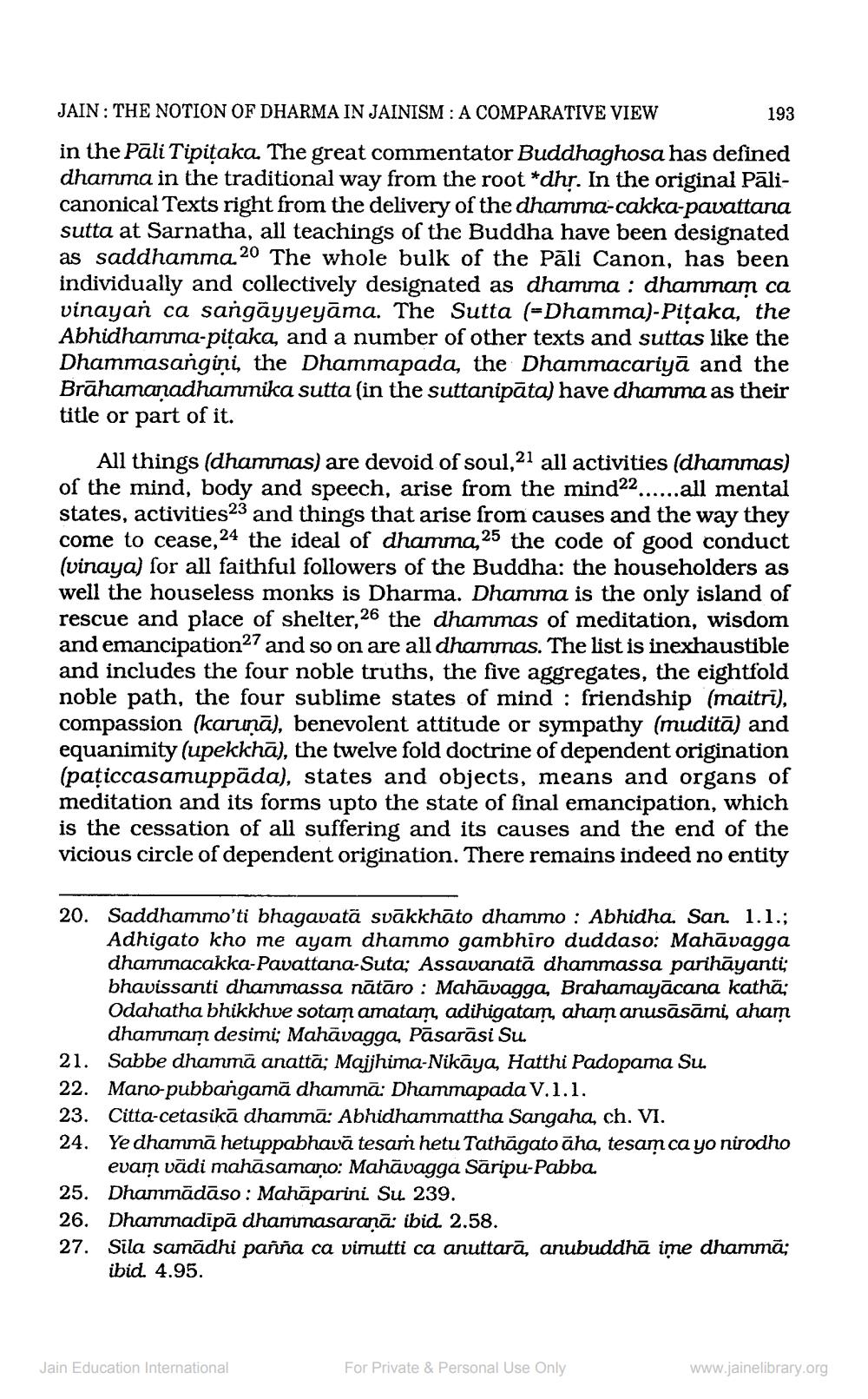________________
JAIN : THE NOTION OF DHARMA IN JAINISM : A COMPARATIVE VIEW
193
in the Pali Tipitaka. The great commentator Buddhaghosa has defined dhamma in the traditional way from the root *dhr. In the original Pālicanonical Texts right from the delivery of the dhamma-cakka-pavattana sutta at Sarnatha, all teachings of the Buddha have been designated as saddhamma. 20 The whole bulk of the Pāli Canon, has been individually and collectively designated as dhamma : dhammam ca vinayan ca sangāyyeyāma. The Sutta (-Dhamma)-Pitaka, the Abhidhamma-pitaka, and a number of other texts and suttas like the Dhammasangiņi, the Dhammapada, the Dhammacariyā and the Brāhamanadhammika sutta (in the suttanipāta) have dhamma as their title or part of it.
All things (dhammas) are devoid of soul,21 all activities (dhammas) of the mind, body and speech, arise from the mind22......all mental states, activities 23 and things that arise from causes and the way they come to cease, 24 the ideal of dhamma, 25 the code of good conduct (vinaya) for all faithful followers of the Buddha: the householders as well the houseless monks is Dharma. Dhamma is the only island of rescue and place of shelter, 26 the dhammas of meditation, wisdom and emancipation27 and so on are all dhammas. The list is inexhaustible and includes the four noble truths, the five aggregates, the eightfold noble path, the four sublime states of mind : friendship (maitri), compassion (karunā), benevolent attitude or sympathy (muditā) and equanimity (upekkhā), the twelve fold doctrine of dependent origination (pațiccasamuppāda), states and objects, means and organs of meditation and its forms upto the state of final emancipation, which is the cessation of all suffering and its causes and the end of the vicious circle of dependent origination. There remains indeed no entity
-
20. Saddhammo'ti bhagavatā svākkhāto dhammo : Abhidha. San. 1.1.;
Adhigato kho me ayam dhammo gambhiro duddaso: Mahāvagga dhammacakka-Pavattana-Suta; Assavanatā dhammassa parihāyanti; bhavissanti dhammassa nātāro : Mahāvagga, Brahamayācana kathā; Odahatha bhikkhve sotam amatam, adihigatam, aham anusāsāmi, aham
dhammam desimi; Mahāvagga, Pasarāsi Su. 21. Sabbe dhammā anatta; Majjhima-Nikāya, Hatthi Padopama Su. 22. Mano-pubbangamā dhammā: Dhammapada V.1.1. 23. Citta-cetasikā dhammā: Abhidhammattha Sangaha, ch. VI. 24. Ye dhammā hetuppabhavā tesam hetu Tathāgato āha, tesam cayo nirodho
evam vādi mahāsamano: Mahāvagga Saripu-Pabba. 25. Dhammādāso : Mahāparini. Su 239. 26. Dhammadīpā dhammasaranā: ibid. 2.58. 27. Sila samadhi pañña ca vimutti ca anuttarā, anubuddha ime dhammā;
ibid. 4.95.
Jain Education International
For Private & Personal Use Only
www.jainelibrary.org




